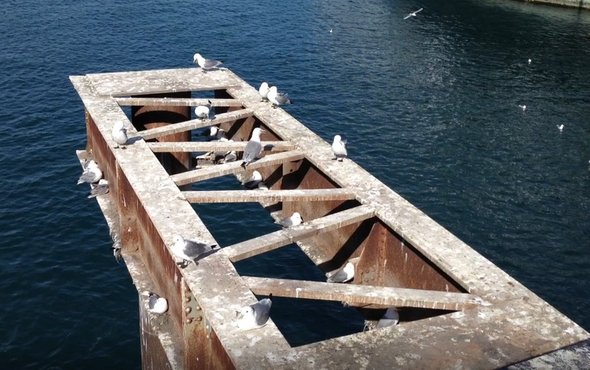(单词翻译:单击)
听力文本
This is Scientific American — 60-Second Science. I'm Christopher Intagliata.
Today we have sophisticated buoys packed with instruments, and robotic underwater drones. But a more than a century ago the seas were surveyed by different types of autonomous data-gathering instruments. Which also happened to be alive:
"We just call them sea otters and white sharks and bluefin tuna." Kyle Van Houtan is director of science at the Monterey Bay Aquarium. And what he means is that marine mammals and fish and seabirds concentrate unique chemical clues about the ocean and what lives in it, within their tissues. "In their bones, in their feathers, in their vertebrae, in their earwax."
For his most recent study, Van Houtan needed to locate feathers from some long-dead birds.
"Let's see, so I'm just looking here, that was a Bulwer's petrel, from French Frigate Shoals—I have the database open in front of me here..." Molly Hagemann, who describes herself as 'a librarian for dead animals' at Honolulu's Bishop Museum, was able to help.
"So that one was collected in May 1891. And then we also had a brown noddy from 1895..."

The scientists analyzed the ratios of heavy to light nitrogen isotopes in those old feathers, compared to ratios in modern-day specimens. And they found that Pacific seabirds of yore ate diets dominated by fish. But the birds of today were fishing farther down in the food web. And seemed to be eating nearly twice as much squid as their ancestors did—maybe due to the combined effects of commercial fishing and climate change. The details are in the journal Science Advances.
Now, nothing against consuming calamari. But: "KVH: It's a risky business to depend on squid. Because squid go through these boom/bust cycles." So the shift in protein source could one day leave the birds hungry.
But the bigger picture is that it appears food webs in the central Pacific have lost components and become less complex over the last 130 years—meaning they're less resilient to changes.
KVH: "It's more than just climate: It's all the noise we're adding to the ocean. All of the contaminants, that were plenty in the ocean, the microplastic. It's a warming ocean. It's an ocean with more nutrients. It's an ocean with less oxygen.."
And it's an ocean with less capacity to recover from all those insults.
Thanks for listening for Scientific American — 60-Second Science. I'm Christopher Intagliata.
参考译文
这里是科学美国人——60秒科学。我是克里斯托弗·因塔利亚塔。
现在,我们拥有装满仪器的精密浮标,还有水下自动无人机。但在一个多世纪以前,海洋调查是通过各种自主数据收集仪器完成的。这些仪器如今依然存在:
“我们称之为海獭、白鲨和蓝鳍金枪鱼。” 凯尔·范·休坦是蒙特利湾水族馆的科学主任。他的意思是海洋哺乳动物、鱼类和海鸟集中于身体组织内的独特化学线索,这些线索与海洋及海洋生物有关。“线索存在于它们的骨骼、羽毛、脊椎和耳垢中。”
在他最近的研究中,范·休坦需要从死亡很久的鸟类身上找羽毛。
“让我想想,当时我只是看着那里,那是一只来自法国军舰浅滩的纯褐鹱,我打开了面前的数据库……”檀香山主教博物馆的莫莉·哈格曼自称为“死亡动物的管理员”,她可以提供帮助。
“那只鸟的收藏时间是1981年5月。后来我们还在1895年收藏了一只白顶玄鸥。”
科学家分析了那些旧羽毛中氮同位素从高到低的比率,并将其与现代标本的比率进行了对比。他们发现,过去太平洋海鸟的食物主要以鱼为主。但现在的鸟儿则在食物链更低端。看起来它们所摄取的鱿鱼数量是其祖先的近两倍,这可能是因为商业捕鱼和气候变化所带来的联合影响。该研究的详细内容刊登在《科学进展》期刊上。
鸟类食用鱿鱼没有什么问题。但是:“凯尔·范·休:鸟类依赖鱿鱼是有风险的。因为鱿鱼数量时多时少。”因此,蛋白质来源的转变有一天可能会让鸟类挨饿。
但更大的背景情况是,在过去130年中,太平洋中央的食物链似乎缺少了成分,而且复合性也有所降低,这意味着食物链对变化的适应能力也有所减弱。
凯尔·范·休:“这不仅仅是气候原因:这是我们加给海洋的所有噪音。海洋里还有很多微塑料污染物。海洋温度不断升高,养分越来越多,但是氧气越来越少。”
而且海洋从所有损害中恢复过来的能力也在减弱。
谢谢大家收听科学美国人——60秒科学。我是克里斯托弗·因塔利亚塔。
译文为可可英语翻译,未经授权请勿转载!
重点讲解
重点讲解:
1. in front of 在…面前;
He tipped the table over in front of him.
他把面前的桌子打翻了。
2. due to 由于;因为;
And that will likely worsen as analysts predict a decrease in the labor force in the next year or two due to a rise in the aging population.
正如分析人士预计的那样,由于老龄化人口的增加,技术工人短缺可能会在未来一两年内恶化劳动人口减少的问题。
3. depend on 依靠;依赖;
Needy and handicapped people depend on government relief for their support.
穷人和残疾人依靠政府的救济维持生计。
4. go through 经历,经受(尤指苦难或艰难时期);
As you go through life, you'll experience joy, pain, loss, discovery, and a thousand other different thoughts and emotions.
在生活中,你会经历喜悦、痛苦、损失、发现和一千种不同的想法和感情。


